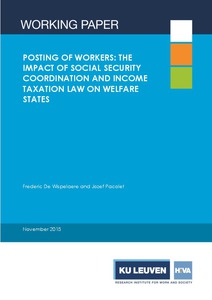Posting of workers: the impact of social security coordination and income taxation law on welfare states
"Posted workers provide on a temporary basis services for their employer outside the Member State where the employer is established. Their wages are taxed for a certain period of time at the taxation level of the sending Member State, which is also the recipient of these tax revenues. The diffe...
| Main Authors: | , |
|---|---|
| Institution: | ETUI-European Trade Union Institute |
| Format: | TEXT |
| Language: | English |
| Published: |
Leuven
2015
HIVA |
| Subjects: | |
| Online Access: | https://www.labourline.org/KENTIKA-19107443124919256259-Posting-of-workers-the-impact-.htm |
| Summary: | "Posted workers provide on a temporary basis services for their employer outside the Member State where the employer is established. Their wages are taxed for a certain period of time at the taxation level of the sending Member State, which is also the recipient of these tax revenues. The differences in labour tax rates between the sending and the receiving Member State might lead to a tax and competitive advantage for ‘foreign’ service providers and their employees posted to another Member State. Labour taxes levied to the income of the posted workers are estimated to be equal to approximately 0.7% of the total monthly labour tax revenues of the sending Member States. Sending ‘new’ Member States are clearly more dependent on the labour tax revenues of posted workers as share of the total labour tax revenues compared to the sending ‘old’ Member States. Also, labour tax revenues from these workers living in the sending ‘new’ Member States would decrease by 77% if these workers would not be posted but employed in their sending Member State. This outcome is the result of an important flow of posted workers towards higherwage Member States. It proves that sending Member States benefit from respecting minimum wages in the Member State of employment and the collection of the proper amount of social contributions and income taxes. Otherwise, these labour tax revenues will be much lower. An alternative scenario, a tax harmonisation based on the ‘source’ principle (i.e. paying taxes at the taxation level of the receiving Member State in the sending Member State) could be introduced in order to remove tax competition and to create (already ongoing) upward ‘social’ convergence. This alternative scenario on average increases labour tax revenues from posted workers ‘only’ by 3% compared to the current situation, in particular since labour tax rates of the ‘new’ and ‘old’ Member States are quite similar to each other. Where labour tax revenues from posted workers will decrease by 2% in the ‘old’ sending Member States, a higher increase of revenues will be realised in the ‘new’ sending Member States (+8%)." |
|---|---|
| Physical Description: | 26 p. Digital |

